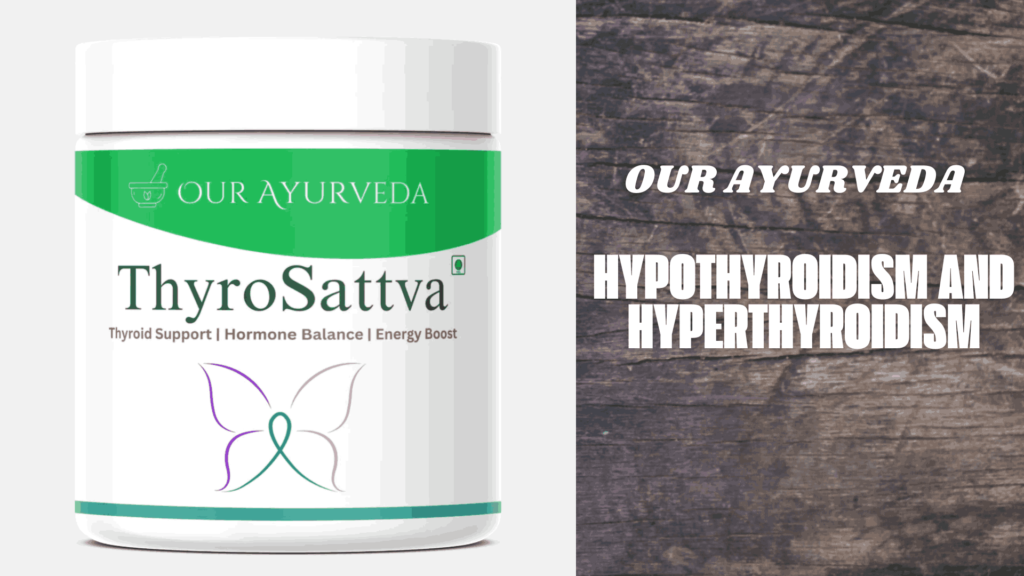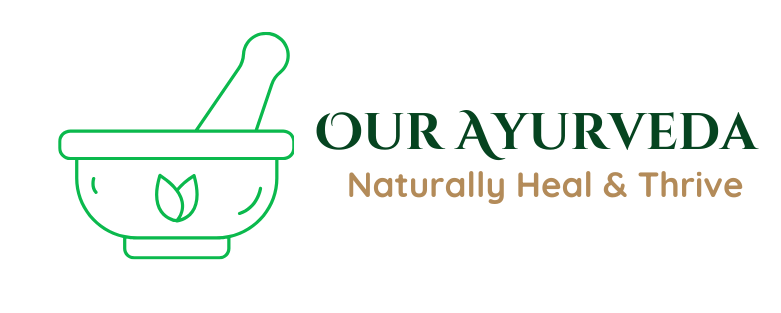

What are hypothyroidism and hyperthyroidism?
Hypothyroidism and hyperthyroidism are two prevalent thyroid disorders that significantly
impact the functioning of the thyroid gland. Below, we delve into Ayurvedic remedies and
approaches for managing these conditions effectively.
Understanding Hypothyroidism
Hypothyroidism is a condition marked by the underperformance of the thyroid gland, which
produces insufficient thyroid hormones. This gland, situated at the front of the neck, plays a
pivotal role in maintaining metabolism and energy levels. When hormone production is
compromised, various bodily functions slow down.
The primary cause of hypothyroidism is Hashimoto’s thyroiditis, an autoimmune disorder
where the immune system erroneously attacks the thyroid gland, leading to inflammation and
damage. Other causes include surgical removal of the thyroid, radiation exposure, and specific
medications, or even congenital factors.
Risk Factors for Hypothyroidism
Certain factors heighten the risk of developing hypothyroidism, including:
- Age and Gender: Women and older individuals are more susceptible.
- Family History: A family history of thyroid disorders can increase vulnerability.
- Medical History: Conditions like type 1 diabetes, lupus, or rheumatoid arthritis.
- Iodine Deficiency: An inadequate iodine intake disrupts thyroid hormone production.
- Environmental exposure: Toxins and some medications can also contribute.
Visit https://ourayurveda.in/ to explore effective treatments.
Understanding Hyperthyroidism
Hyperthyroidism, in contrast, is caused by an overactive thyroid gland that produces
excessive thyroid hormones. This results in a heightened metabolic rate and a wide array of
symptoms.
The most common cause is Graves’ disease, an autoimmune condition where the immune
system overstimulates the thyroid gland. Other causes may include thyroid nodules,
inflammation (thyroiditis), or certain medications.
Risk Factors for Hyperthyroidism
Factors that increase the likelihood of developing hyperthyroidism include:
- Family History: A genetic predisposition to thyroid issues.
- Gender and Age: Women over 60 are at greater risk.
- High Iodine Intake: Excessive iodine can disrupt thyroid balance.
- Stress and Radiation Exposure: Both are notable triggers.
How Are These Conditions Diagnosed? - Both hypothyroidism and hyperthyroidism are diagnosed through blood tests that assess
- levels of thyroid hormones and thyroid-stimulating hormone (TSH).
- Hypothyroidism Treatment: Typically involves daily hormone replacement therapy.
- Hyperthyroidism Treatment: May include medications to inhibit hormone
- production, radioactive iodine therapy, or thyroid surgery.
- For personalized Ayurvedic solutions, consult a leading Ayurvedic practitioner.
- Visit – https://ourayurveda.in/ for more insights.
Symptoms of Thyroid Disorders
- Recognizing symptoms early is crucial for effective treatment. Below are some common symptoms
- of both conditions:
- Symptoms of Hypothyroidism
- Persistent fatigue
- Unexplained weight gain
- Sensitivity to cold
- Constipation
- Dry, flaky skin
- Hair thinning or loss
- Depression and memory issues
- Slow heart rate
- Muscle weakness
Symptoms of Hyperthyroidism
- Symptoms of Hyperthyroidism
- Unintentional weight loss
- Anxiety or nervousness
- Rapid or irregular heartbeat
- Tremors in hands or fingers
- Excessive sweating
- Heat intolerance
- Insomnia
- Frequent bowel movements or diarrhea
- Bulging eyes (associated with Graves’ disease)
- Ayurvedic Approach to Thyroid Health
Ayurveda offers holistic solutions to balance thyroid function by addressing the root causes.
Using natural remedies, dietary adjustments, and lifestyle changes, Ayurveda focuses on
restoring harmony in the body. Some commonly used Ayurvedic treatments include:
- Herbal Remedies: Herbs like ashwagandha, guggulu, and brahmi help balance
thyroid hormones. - Dietary Guidance: Incorporating iodine-rich foods and avoiding processed meals.
- Stress Management: Techniques like yoga and meditation to reduce stress, a
common trigger for thyroid disorders. - Panchakarma Therapy: Detoxifying the body to restore thyroid health.
Taking a holistic approach through Ayurveda can significantly improve thyroid health. If you are
struggling with hypothyroidism or hyperthyroidism, consider exploring these natural remedies for a
balanced, healthier life.
Understanding Hyperthyroidism
Hyperthyroidism, in contrast, is caused by an overactive thyroid gland that produces
excessive thyroid hormones. This results in a heightened metabolic rate and a wide array of
symptoms.
The most frequent cause is Graves’ disease, an autoimmune condition where the immune
system overstimulates the thyroid gland. Other causes may include thyroid nodules,
inflammation (thyroiditis), or certain medications.
Risk Factors of Hyperthyroidism
Factors increasing the likelihood of developing hyperthyroidism include:
- Family History: A genetic predisposition to thyroid issues.
- Gender and Age: Women over 60 are at greater risk.
- High Iodine Intake: Excessive iodine can disrupt thyroid balance.
- Stress and Radiation Exposure: Both are notable triggers.
How Are These Conditions Diagnosed?
Both hypothyroidism and hyperthyroidism are diagnosed through blood tests that assess
levels of thyroid hormones and thyroid-stimulating hormone (TSH).
- Hypothyroidism Treatment: Typically involves daily hormone replacement therapy.
- Hyperthyroidism Treatment: This may include medications to inhibit hormone
production, radioactive iodine therapy, or thyroid surgery.
For personalized Ayurvedic solutions, consult a leading Ayurvedic practitioner. Visit
https://ourayurveda.in/ for more insights.
Symptoms of Thyroid Disorders
Recognizing symptoms early is crucial for effective treatment. Below are common symptoms
of both conditions:
Symptoms of Hyperthyroidism - Unintentional weight loss
- Anxiety or nervousness
- Rapid or irregular heartbeat
- Tremors in hands or fingers
- Excessive sweating
- Heat intolerance
- Insomnia
- Frequent bowel movements or diarrhea
- Bulging eyes (associated with Graves’ disease)
- Ayurvedic Approach to Thyroid Health
Ayurveda offers holistic solutions to balance thyroid function by addressing the root causes.
Using natural remedies, dietary adjustments, and lifestyle changes, Ayurveda focuses on
restoring harmony in the body. Some commonly used Ayurvedic treatments include:
- Herbal Remedies: Herbs like ashwagandha, guggulu, and brahmi help balance
thyroid hormones. - Dietary Guidance: Incorporating iodine-rich foods and avoiding processed meals.
- Stress Management: Techniques like yoga and meditation to reduce stress, a
common trigger for thyroid disorders. - Panchakarma Therapy: Detoxifying the body to restore thyroid health.
Taking a holistic approach through Ayurveda can significantly improve thyroid health. If you are
struggling with hypothyroidism or hyperthyroidism, consider exploring these natural remedies for a
balanced, healthier life.
Conclusion
ThyroSattva by Our Ayurveda is more than just a remedy—it’s a pathway to holistic health.
By addressing the root causes of thyroid imbalances and promoting overall well-being,
ThyroSattva is a reliable, natural solution for anyone struggling with thyroid disorders.
Reclaim your energy, vitality, and hormonal harmony with ThyroSattva today!
For more information or to place an order, visit our official website, Our Ayurveda.



